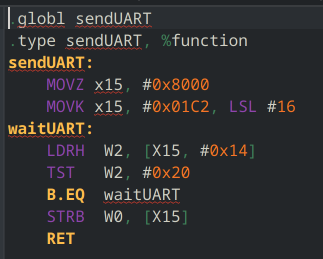extern var a: T means that a is an alias for the symbol a:
a will return the value of the symbol a&a will return the address of the symbol a.
const b = @extern(*T, .{ .name = "a" }) means that b is a pointer to the symbol a, not an alias for it:
b will return the address of the symbol a (not the value of a).&b will return the address of b (not the address of a).b.* will return the value of the symbol a.
If the symbol represents a pointer and not a value, it is critical that you take into account the additional level of indirection introduced by @extern(), which extern doesn’t. For that reason, it can be a good idea to prefer extern when possible.
Example (x86-64):
comptime {
asm (
\\ .data
\\ .globl foo
\\ .align 4
\\foo:
\\ .long 123
\\
\\ .text
\\ .globl getFooPtr
\\getFooPtr:
\\ lea foo(%rip),%rax
\\ ret
\\
\\ .text
\\ .globl getFoo
\\getFoo:
\\ mov foo(%rip),%eax
\\ ret
\\
\\ .text
\\ .globl setFoo
\\setFoo:
\\ mov %ecx,foo(%rip)
\\ ret
);
}
Using extern:
const std = @import("std");
extern var foo: i32;
extern fn getFooPtr() *i32;
extern fn getFoo() i32;
extern fn setFoo(value: i32) void;
test {
try std.testing.expectEqual(&foo, getFooPtr());
try std.testing.expectEqual(123, foo);
try std.testing.expectEqual(123, getFoo());
try std.testing.expectEqual(123, getFooPtr().*);
foo = 456;
try std.testing.expectEqual(456, foo);
try std.testing.expectEqual(456, getFoo());
try std.testing.expectEqual(456, getFooPtr().*);
setFoo(789);
try std.testing.expectEqual(789, foo);
try std.testing.expectEqual(789, getFoo());
try std.testing.expectEqual(789, getFooPtr().*);
}
Using @extern():
const std = @import("std");
const foo = @extern(*i32, .{ .name = "foo" });
const getFooPtr = @extern(*const fn () callconv(.c) *i32, .{ .name = "getFooPtr" });
const getFoo = @extern(*const fn () callconv(.c) i32, .{ .name = "getFoo" });
const setFoo = @extern(*const fn (value: i32) callconv(.c) void, .{ .name = "setFoo" });
test {
try std.testing.expectEqual(foo, getFooPtr());
try std.testing.expectEqual(123, foo.*);
try std.testing.expectEqual(123, getFoo());
try std.testing.expectEqual(123, getFooPtr().*);
foo.* = 456;
try std.testing.expectEqual(456, foo.*);
try std.testing.expectEqual(456, getFoo());
try std.testing.expectEqual(456, getFooPtr().*);
setFoo(789);
try std.testing.expectEqual(789, foo.*);
try std.testing.expectEqual(789, getFoo());
try std.testing.expectEqual(789, getFooPtr().*);
}
Take note of how &foo vs foo vs foo.* are used.
![]() especially now that I am over the 0.15.1 objCopy hurdles
especially now that I am over the 0.15.1 objCopy hurdles ![]()
